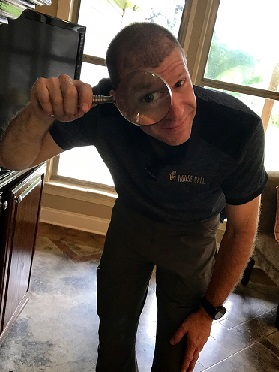As I recently celebrated my 54th birthday, I was surprised to receive a gift that I had not been expecting. Responding to a knock at the front door, my daughter was shocked to find a sheriff’s deputy standing there, waiting to serve me with a lawsuit. While it wasn’t on my wish-list, that was one birthday surprise that will be remembered longer than most other gifts I received that day!

This particular lawsuit was regarding an inspection that one of my inspectors had done over three years ago. As is often the case with suits filed against home inspectors, this one was put together by an inexperienced attorney looking for a quick pay day. In this case, it appears that the plaintiff’s attorney hadn’t even bothered to read the home inspection report, the inspection agreement, the Louisiana standards of practice or the laws regarding home inspections in our state, all of which could easily be used by any competent jurist to quickly dismiss this attempted money grab.
As is all too often the case with low-end practitioners of the legal profession, it’s a “shoot first and ask questions later” mentality. It cost almost nothing for them to file frivolous lawsuits against home inspectors, knowing that the cost for us to countersue them to recover attorney’s fees and court costs spent in our defense (as typically allowed for in our home inspection agreement) is often too high for us to pursue.
So, we’re often left spending our own money to defend ourselves against these baseless claims, all the while gaining little to nothing in return. In this particular case, I decided to turn this unfortunate situation into something worthwhile and tried to use the case as a learning opportunity for me and my fellow home inspectors.
As I’ve been in the industry since 2001 and had previously served as general manager for a large inspection company, I’m quite familiar with how these lawsuits typically play out. But I realize that there are many inspectors out there who aren’t familiar with the process of being sued, so I decided to use what I learned from this experience to put together a continuing education class for the industry. I kept records of everything that happened, carefully taking notes at each step along the way that could be used to develop a constructive CE class.
Even though I’ve been through this several times before, both on a personal level and while helping other inspectors navigate the process, it always seems like there’s something to be learned each time this happens. As long as you keep your mind open to instruction, and don’t think you already know everything there is to know about our industry, education can be found in even the most unlikely of places.

As typically occurs in these situations, I spent a bit of time on the phone talking with a representative from my home inspection insurance provider. After I had explained the situation and answered all her questions about the case, I used the opportunity to question her about home inspection lawsuits in general. I explained that I was putting together a CE class on the subject and asked for any advice that she could give me to share with other inspectors, to lessen the chances that they would find themselves in a similar situation.
She shared with me these recommendations for protecting yourself from lawsuits:
1. Always get your inspection agreement signed before you show up to do the home inspection.
A legal tactic often used by attorneys in an attempt to get our (highly restrictive) home inspection agreement invalidated in court is to claim that the plaintiff signed the contract under duress, and therefore should not be held to its stipulations. They will argue that their client had no choice but to sign our contract, as they were on the last day of their inspection period, had already paid us for the inspection and we held their report hostage, refusing to allow them access to the report until they signed our paperwork.
While this tactic doesn’t always work, we must be cognizant of this approach, and remain aware that courts often side with the party that appears to be the weaker entity in a negotiation. Unfortunately, in the case of a home inspection contract, our client is considered to be the weaker party, as they have little or no ability to negotiate changes to our home inspection agreement.
By simply having our contract signed before the day of the inspection, we can easily remove this argument from the opposing counsel’s arsenal. And most home inspection insurance providers require that we get our contracts signed ahead of time in order to maintain our coverage.
And in today’s digital world, there should be very few instances where we haven’t had our clients sign our inspection agreement (and pay us) before we ever step foot on the property.
2. Don’t be scared to report potential problems to your home inspection insurance company.
We all pay enough for our insurance coverage already, and the thought of our insurance premiums increasing is enough to scare even the most grizzled home inspector. But fear of rising insurance rates shouldn’t keep us from taking advantage of the services that our insurance provider offers to us, their clients.
Most home inspection insurance providers offer some type of “pre-claims assistance” to their policy holders. This service can be utilized by inspectors to squash any potential customer issues before they rise to the level of a lawsuit. By getting our insurance provider’s team of advisors and attorneys involved early on in the complaint process, potential problem clients can often be dealt with in a way both resolves the issue and keeps us from paying a deductible for a claim.
Some insurance companies, like my provider InspectorPro, even offer a discount on claim deductibles, if they’re involved in potential problem cases early on and can’t resolve the situation before it becomes a lawsuit.
Take advantage of any pre-claims assistance program that your provider offers. Anything that can reduce the level of stress in our business and keep us out of the court system is a win in my book!
3. Include lots of pictures in our reports.
Obviously, most of us use pictures in our inspection reports. You’d be hard-pressed to find more than a handful of dinosaur inspectors out there who refuse to include at least some pictures in their final product. It’s easy, it makes for a more polished report, and it’s basically free to add pictures to our home inspection report.
And even though our clients are unlikely to actually read our inspection report, we know that at the very least they’ll look at the pictures.
Obviously, we should be including pictures of the problems that we discover during our inspection, but we should also remember that pictures can be used to protect us if (and when) we end up in court. We should be using pictures to tell the story of our inspection. No one is going to remember that there was a grand piano blocking access to that window while we were at the house, but if we have a picture of the piano in our inspection report, when we’re later questioned as to why we didn’t find that moisture damaged floor below the window, it’s much easier to prove that we were limited in our inspection of the area.
I like to take what I call “proof-pictures,” to help document exactly what I was doing during the inspection. (Thankfully) most of my clients aren’t following me every second of every inspection, so they don’t get to see me walking on the roof, crawling under the house or running the water in the sinks and tubs. By taking pictures of these events, I’m able to provide photographic evidence of exactly what services I provided them for their money, and it’s much easier to defend myself against future accusations of non-performance.
They say that a picture is worth a thousand words. In the case of a home inspection, it could be worth a whole lot more.
4. Never say I’m sorry.
While this may seem like some terrible advice to get from a marriage counselor, it’s great (albeit surprising) advice when it comes to our inspection business.
In most states, telling a client that we’re sorry when there’s a problem can be construed as admitting fault, and is a terrible way to enter into a litigious situation. Doing anything that can be taken as admitting fault can throw a monkey-wrench in our legal defense, and may even be enough to cause our insurance provider to deny coverage to us during a claim.
It’s OK to tell a complainant that we sympathize (or empathize) with them when they’re having issues. After all, every one of us has had problems with a home that we’ve purchased; it’s part of owning a home: things are going to break when we least expect it.
Showing our clients that we’re human and experience the same problems that they do can be a wonderful tool for developing successful relationships. We just need to be on guard against letting those little words (I’m sorry) slip from our lips.

It’s said that there are only two types of home inspectors: ones that have been sued and ones that are going to be sued. Just because we live in a litigious society, where bottom-of-the-barrel attorneys are allowed to file frivolous lawsuits without repercussions, doesn’t mean that we shouldn’t do everything in our power to protect ourselves from these low-end lawyers.
By dotting our i’s and crossing our t’s and doing the little things to cover our butt, we can help make sure that if we do end up getting served paperwork on our birthday, we’ve got an airtight defense.
And, we won’t even have to say we’re sorry.
I welcome all feedback (both positive and negative) on this post.
Please take a moment to leave a comment below. Thank you!
Want to be an Influencer in Your Field? Share This Post!
Thanks, Joe

